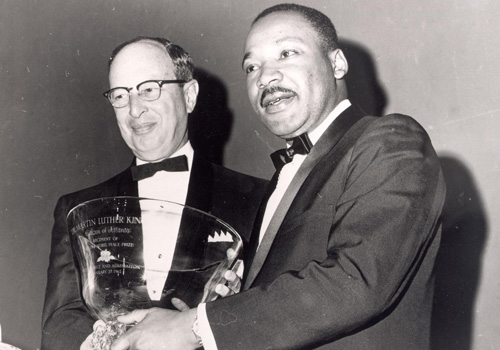Autumn 2008

surprise ending: Rabbi Jacob M. Rothschild and Martin Luther King Jr. at the South’s first racially integrated banquet in 1965.
Courtesy MARBL
A United Front
Emory marks fiftieth anniversary of the Atlanta Temple bombing
By Lea McLees
Fifty years ago, exploding dynamite ripped a gaping hole in the brick edifice of The Temple-Hebrew Benevolent Congregation on Peachtree Street, home to Atlanta’s oldest and largest Jewish congregation. The October 12, 1958, attack was linked to an epidemic of hate group activity plaguing the South during the civil rights movement.
The impact of this brutal act on Atlanta’s Jewish community and on the civil rights movement is documented in the exhibition “The Bomb That Healed: Rabbi Jacob M. Rothschild, Civil Rights, and The Temple Bombing of 1958,” now on view at the Manuscript, Archives, and Rare Book Library (MARBL) in Emory’s Robert W. Woodruff Library.
The effect of the bombing was not what its creators might have expected, says exhibition curator Ellen G. Rafshoon.
“The bombers had intended to intimidate Jews, who were seen as coconspirators along with blacks in the civil rights struggle—but this act of terror had the opposite effect,” says Rafshoon, a history professor at Georgia Gwinnett College. “When The Temple’s spiritual leader, Rabbi Rothschild, returned to his office the following day, he was greeted with mailbags filled with sympathetic messages from Atlanta and across the nation.”
The overwhelming support extended to the congregation gave Atlanta Jews the confidence to become more active in bridging the divide between whites and blacks, Rafshoon noted. That’s why Rothschild’s widow, Janice, has referred to the otherwise tragic event as “the bomb that healed.”
The exhibition, which draws on Rabbi Rothschild’s personal papers and includes letters, photographs, and news clippings, shows how the rabbi worked openly to build support for desegregation among Atlanta’s religious and civic leaders.
“This was an especially significant achievement, considering that some of Atlanta’s Jews feared challenging Atlanta’s rigid racial order,” explains Eric Goldstein, associate professor of history and Jewish studies at Emory. “They themselves had often been victims of social discrimination and even virulent attacks such as the lynching of Leo Frank in 1915. They hoped that if they kept a low profile, discrimination would pass, and they would eventually be accepted.”
With Rabbi Rothschild’s encouragement and the more accepting environment they found in the wake of the bombing, Goldstein says, many Atlanta Jews found they could confront discrimination, both against themselves and against African Americans, and even become leaders in the cause.
One of the most rewarding moments in Rabbi Rothschild’s career is highlighted in the exhibition: the rabbi’s successful organization of the South’s first racially integrated banquet, which honored Martin Luther King Jr. after he won the Nobel Peace Prize.
That event, held at the Dinkler Plaza Hotel on January 27, 1965, was attended by 1,400 guests. The banquet, King later wrote, “was a testimonial not only to me but to the greatness of the city of Atlanta, the South, the nation, and its ability to rise above the conflict of former generations.”
Lea McLees is director of communications for University Libraries.